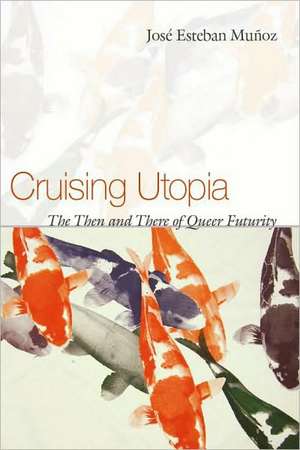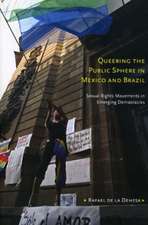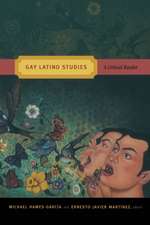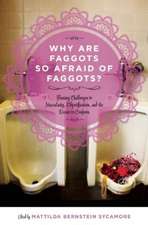Cruising Utopia: Sexual Cultures (Paperback)
Autor Jose Esteban Munozen Limba Engleză Paperback – 30 aug 2023
Preț: 136.13 lei
Nou
Puncte Express: 204
Preț estimativ în valută:
26.05€ • 27.27$ • 21.55£
26.05€ • 27.27$ • 21.55£
Carte disponibilă
Livrare economică 15-29 martie
Preluare comenzi: 021 569.72.76
Specificații
ISBN-13: 9780814757284
ISBN-10: 0814757286
Pagini: 223
Ilustrații: 29 illustrations
Dimensiuni: 152 x 229 x 18 mm
Greutate: 0.39 kg
Editura: NEW YORK UNIVERSITY PRESS
Seria Sexual Cultures (Paperback)
Locul publicării:United States
ISBN-10: 0814757286
Pagini: 223
Ilustrații: 29 illustrations
Dimensiuni: 152 x 229 x 18 mm
Greutate: 0.39 kg
Editura: NEW YORK UNIVERSITY PRESS
Seria Sexual Cultures (Paperback)
Locul publicării:United States
Cuprins
Acknowledgments vii ; Introduction: Feeling Utopia 1; 1. Queerness as Horizon: Utopian Hermeneutics in the Face of Gay Pragmatism 25; 2. Ghosts of Public Sex 45; 3. The Future is in the Present: Sexual Avant-Gardes and the Performance of Utopia 66; 4. Gesture, Ephemera, and Queer Feeling: Approaching Kevin Aviance 89; 5. Cruising the Toilet: LeRoi Jones/Amiri Baraka, Radical Black Traditions and Queer Futurity 114; 6. Stages: Queers, Punks, and the Utopian Performative 133; 7. Utopia's Seating Chart: Ray Johnson, Jill Johnston, and Queer Intermedia as System 153; 8. Just Like Heaven: Queer Utopian Art and the Aesthetic Dimension 174; 9. A Jeté Out the Window: Fred Herkos Incandescent Illumination 194; 10. After Jack: Queer Failure, Queer Virtuosity 220; Conclusion: Take Ecstasy with Me 239; Selected Bibliography 246; Notes 259; Index 000; About the Author 287
Recenzii
"Brilliant, extraordinary, and necessary, Muñozs critical refusal of queer pragmatism, his commitment to the utopian force of the radical attempt - the radical aesthetic, erotic, and philosophical experiment - is indispensable in an historical moment characterized by political surrender and intellectual timidity passing itself off as boldness. Fred Moten, author of In the Break
"Muñoz takes Ernst Bloch as his Virgil as he descends into the dark woods of futurity looking for signposts along the way that will guide him to a place of hope, belonging, queerness and quirkiness. Refusing to simply sign on to the anti-relational, anti-future brand of queer theory espoused by Edelman, Bersani and others, Muñoz insists that for some queers, particularly for queers of color, hope is something one cannot afford to lose and for them giving up on futurity is not an option.- Judith Halberstam, author of In a Queer Time and Place
"Muñoz draws on a dynamic roster of seminal artists to illustrate his vision of a utopian queer future... Queer theorists will find the book's provocative thesis stimulating. Publishers Weekly, 28th Sept 2009
"Brilliant, extraordinary, and necessary, Munoz's critical refusal of queer pragmatism, his commitment to the utopian force of the radical attempt - the radical aesthetic, erotic, and philosophical experiment - is indispensable in an historical moment characterized by political surrender and intellectual timidity passing itself off as boldness." Fred Moten, author of In the Break "Munoz takes Ernst Bloch as his Virgil as he descends into the dark woods of futurity looking for signposts along the way that will guide him to a place of hope, belonging, queerness and quirkiness. Refusing to simply sign on to the 'anti-relational', anti-future brand of queer theory espoused by Edelman, Bersani and others, Munoz insists that for some queers, particularly for queers of color, hope is something one cannot afford to lose and for them giving up on futurity is not an option."- Judith Halberstam, author of In a Queer Time and Place "Munoz draws on a dynamic roster of seminal artists to illustrate his vision of a utopian queer future... Queer theorists will find the book's provocative thesis stimulating." Publisher's Weekly, 28th Sept 2009
"Muñoz takes Ernst Bloch as his Virgil as he descends into the dark woods of futurity looking for signposts along the way that will guide him to a place of hope, belonging, queerness and quirkiness. Refusing to simply sign on to the anti-relational, anti-future brand of queer theory espoused by Edelman, Bersani and others, Muñoz insists that for some queers, particularly for queers of color, hope is something one cannot afford to lose and for them giving up on futurity is not an option.- Judith Halberstam, author of In a Queer Time and Place
"Muñoz draws on a dynamic roster of seminal artists to illustrate his vision of a utopian queer future... Queer theorists will find the book's provocative thesis stimulating. Publishers Weekly, 28th Sept 2009
"Brilliant, extraordinary, and necessary, Munoz's critical refusal of queer pragmatism, his commitment to the utopian force of the radical attempt - the radical aesthetic, erotic, and philosophical experiment - is indispensable in an historical moment characterized by political surrender and intellectual timidity passing itself off as boldness." Fred Moten, author of In the Break "Munoz takes Ernst Bloch as his Virgil as he descends into the dark woods of futurity looking for signposts along the way that will guide him to a place of hope, belonging, queerness and quirkiness. Refusing to simply sign on to the 'anti-relational', anti-future brand of queer theory espoused by Edelman, Bersani and others, Munoz insists that for some queers, particularly for queers of color, hope is something one cannot afford to lose and for them giving up on futurity is not an option."- Judith Halberstam, author of In a Queer Time and Place "Munoz draws on a dynamic roster of seminal artists to illustrate his vision of a utopian queer future... Queer theorists will find the book's provocative thesis stimulating." Publisher's Weekly, 28th Sept 2009
Notă biografică
Jose Esteban Munoz was Professor and past Chair of Performance Studies at New York University. He is the author of Disidentifications: Queers of Color and the Performance of Politics and co-editor of Pop Out: Culture and Dance in Latin/o America and Everynight Life: Queer Warhol.
Descriere
Argues that the here and now are not enough and issues an urgent call for the revivification of the queer political imagination













